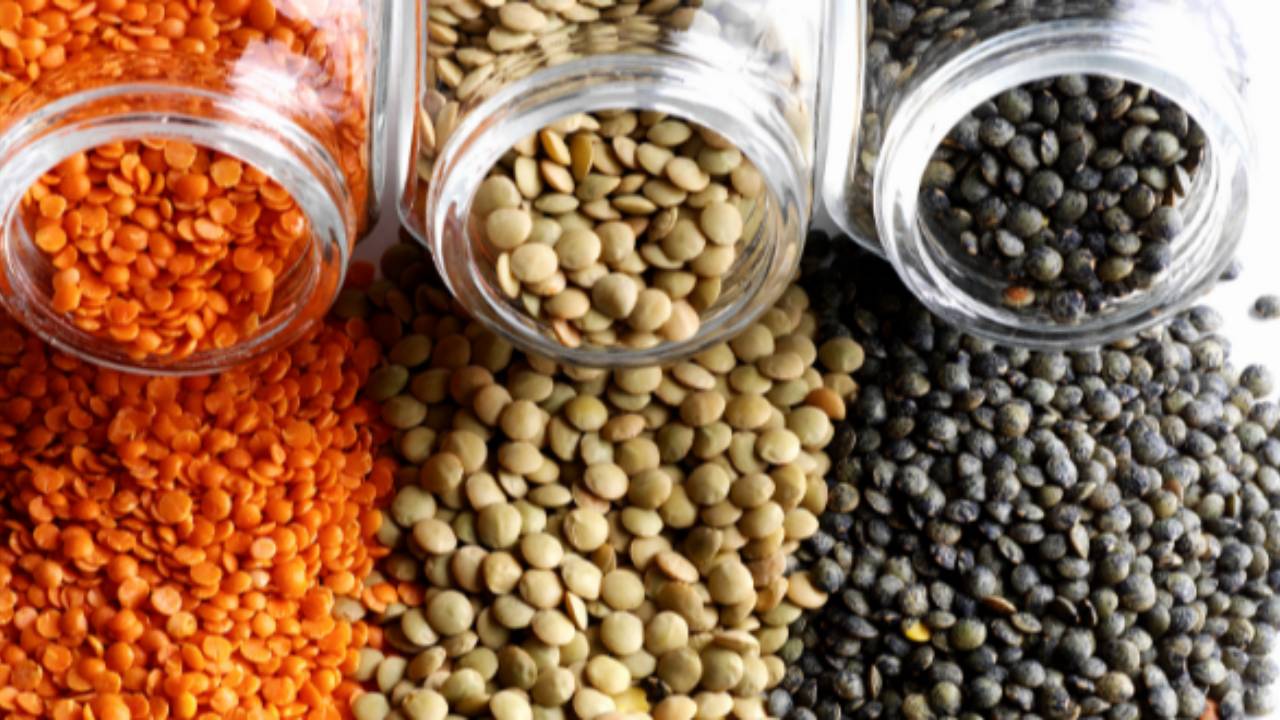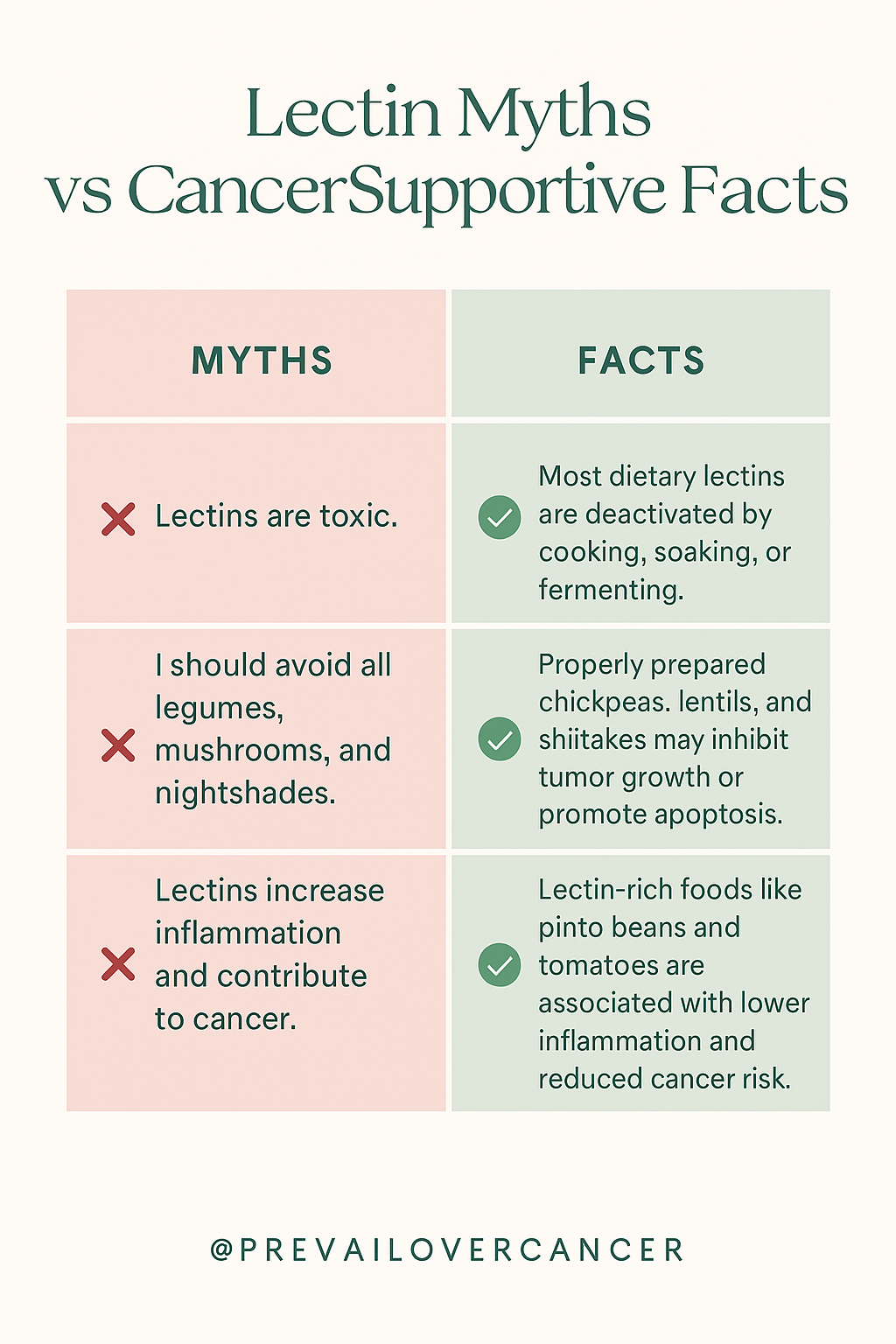Lectins and Cancer - You will be surprised!

Plant lectin impacts on cancer cells, risks, and treatments.
Written by Keith Bishop, Clinical Nutritionist, Clinical Nutritionist, Retired Pharmacist, Founder of Prevail Over Cancer
What are Lectins?
Lectins are a type of protein found in many plant-based foods such as fruits, vegetables, and whole grains. According to a 2015 review out of China published in the Cell Proliferation, plant lectins can modify the expression of specific immune cells and alter signaling pathways to help kill off cancer cells and block tumor growth.[a]
How Lectins Interact with Cancer Cells
Interestingly, some lectins are used to detect and diagnose cancer cells. Lectins manifest diverse activities, including inhibiting virus, and antitumor, antifungal, and anti-insect activities. Others are used for therapeutic purposes because of their anti-tumor activity and ability to trigger cancer cell death.[b]
Plant lectins attach to cancer cells and induce their cell death through autophagy (the body breaking down and consuming the cells) and/or apoptosis (normal cell death instead of prolonged growth). Most recently researchers are checking out the benefits of plant lectins to prevent and treat #oralcancer. [j]
Are Lectins Harmful?
However, it is important to note that not all lectins are beneficial. Some lectins can be harmful if consumed in large amounts or if they are not properly prepared. If you eat foods in the ways that they have historically been prepared and consumed, there is no evidence of cooked lectins contributing to health problems.

📥 Want a printable chart of lectin-rich foods that support cancer defense? Download our free guide here.
How to Prepare Lectin-Rich Foods Safely
Some ways to reduce lectins in foods include soaking and sprouting legumes, cooking them thoroughly, and avoiding processed foods.
Cancer-Supportive Lectin-Rich Foods
Lectins are found in many plant-based foods such as legumes (beans, lentils, peas, soybeans), nightshade vegetables (tomatoes and eggplant), grains (such as barley, quinoa, and rice), and whole wheat.
Here is a list of some plant foods that are high in lectins:
- Chickpeas (also known as garbanzo beans)
- Red, green, yellow and brown lentils
- Black-eyed and garden peas
- Kidney beans, runner beans, broad beans (fava beans), castor bean, butter beans (Lima beans), cannellini beans, haricots, pinto beans, black beans (turtle beans) flageolet beans, and borlotti beans.

Learn How to Select a Quality Dietary Supplement
Several of my social media posts show high lectin foods often show benefit in preventing cancer. These include:
-Chickpeas[d]
-Mushrooms[e]
-Pinto Beans[f]
-Sunflower Seeds[g]
-Lentils[h]
-Quinoa[i]
-Black Beans [k]
-Kidney Beans [l]
I do not recommend adding rice to the above beans as due to the high carbohydrate content.
📚Download your FREE Cancer Food Tactics Outline Guide
Cancer and Lectin References
[a] Jiang, L., Zhang, S., Tian, M., Zhang, Y., Xie, T., Chen, Y., Chen, J., He, J., Liu, J., Ouyang, L., & Jiang, X. (2015). Plant lectins, from ancient sugar-binding proteins to emerging anti-cancer drugs in apoptosis and autophagy. Cell Proliferation, 48(1), 17-28. https://doi.org/10.1111/cpr.12155
[b] Bhutia, S. K., Panda, P. K., Sinha, N., Praharaj, P. P., Bhol, C. S., Panigrahi, D. P., Mahapatra, K. K., Saha, S., Patra, S., Mishra, S. R., Behera, B. P., Patil, S., & Maiti, T. K. (2019). Plant lectins in cancer therapeutics: Targeting apoptosis and autophagy-dependent cell death. Pharmacological Research, 144, 8-18. https://doi.org/10.1016/j.phrs.2019.04.001
[d] Gupta, N., Gautam, A. K., & Bhagyawant, S. S. (2019). Biochemical characterisation of lectin from wild chickpea (Cicer reticulatum L.) with potential inhibitory action against human cancer cells. Journal of Food Biochemistry, 43(2), e12712. https://doi.org/10.1111/jfbc.12712
Magee PJ, Owusu-Apenten R, McCann MJ, Gill CI, Rowland IR. Chickpea (Cicer arietinum) and other plant-derived protease inhibitor concentrates inhibit breast and prostate cancer cell proliferation in vitro. Nutrition and Cancer. 2012;64(5):741-748. doi: https://doi.org/10.1080/01635581.2012.688914
[d] Rezvani, V., Pourianfar, H.R., Mohammadnejad, S. et al. Anticancer potentiality and mode of action of low-carbohydrate proteins and peptides from mushrooms. Appl Microbiol Biotechnol 104, 6855–6871 (2020). https://doi.org/10.1007/s00253-020-10707-8
[e] Yin C, Wong JH, Ng TB. Isolation of a Hemagglutinin with Potent Antiproliferative Activity and a Large Antifungal Defensin from Phaseolus vulgaris cv. Hokkaido Large Pinto Beans. Journal of Agricultural and Food Chemistry. 2015;63(22):5439-5448. doi: https://doi.org/10.1021/acs.jafc.5b00475
[f] Zaineddin, A. K., Buck, K., Vrieling, A., Heinz, J., Flesch-Janys, D., Linseisen, J., & Chang-Claude, J. (2012). The Association Between Dietary Lignans, Phytoestrogen-Rich Foods, and Fiber Intake and Postmenopausal Breast Cancer Risk: A German Case-Control Study. Nutrition and Cancer, 64(5), 652–665. https://doi.org/10.1080/01635581.2012.683227
Bosetti, C., Negri, E., Franceschi, S. et al. Olive oil, seed oils and other added fats in relation to ovarian cancer (Italy). Cancer Causes Control 13, 465–470 (2002). https://doi.org/10.1023/A:1015760004130
[g] Aune, D., De Stefani, E., Ronco, A. et al. Legume intake and the risk of cancer: a multisite case–control study in Uruguay. Cancer Causes Control 20, 1605–1615 (2009). https://doi.org/10.1007/s10552-009-9406-z
[i] Fan, X., Guo, H., Teng, C., Yang, X., Qin, P., Richel, A., Zhang, L., Blecker, C., & Ren, G. (2023). Supplementation of quinoa peptides alleviates colorectal cancer and restores gut microbiota in AOM/DSS-treated mice. Food Chemistry, 408, 135196. https://doi.org/10.1016/j.foodchem.2022.135196
[j] Zevallos VF, Herencia LI, Chang F, Donnelly S, Ellis HJ, Ciclitira PJ. Gastrointestinal effects of eating quinoa (Chenopodium quinoa Willd.) in celiac patients. Am J Gastroenterol. 2014;109(2):270-278. doi:10.1038/ajg.2013.431 https://journals.lww.com/ajg/abstract/2014/02000/gastrointestinal_effects_of_eating_quinoa.21.aspx
[k] Sharma, A., Ng, T. B., Wong, J. H., & Lin, P. (2009). Purification and Characterization of a Lectin from Phaseolus vulgaris cv. (Anasazi Beans). Journal of Biomedicine and Biotechnology, 2009, 929568. https://doi.org/10.1155/2009/929568
[l]Hutchins AM, Winham DM, Thompson SV. Phaseolusbeans: impact on glycaemic response and chronic disease risk in human subjects. British Journal of Nutrition. 2012;108(S1):S52-S65. doi: https://doi.org/10.1017/s0007114512000761




